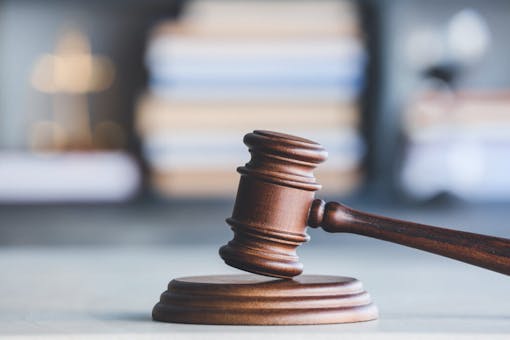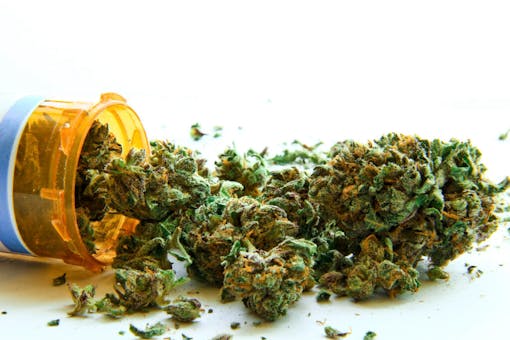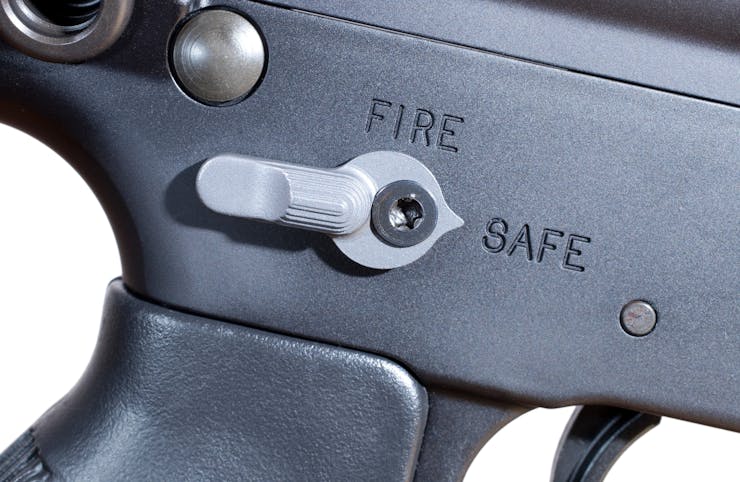This article was written by Andrew Ward and originally published on Benzinga.
Roughly 33% of US adults report owning a gun, according to a 2021 Georgetown University firearms survey. By the end of 2022, New Frontier Data expects 4.7 million Americans to be registered medical cannabis cardholders.
How those two figures impact one another remains uncertain. But with federal laws preventing individuals from legally owning firearms while consuming Schedule I drugs, individuals using both could run into legal trouble.
Like much of U.S. cannabis law, state and federal rules don’t always align.
The ban on gun ownership for medical marijuana users stems from the Gun Control Act of 1968. The law intends to regulate interstate and international firearm commerce while preventing specific individuals from legally participating in the marketplace. Banned individuals include anyone using or addicted to a Schedule I substance.

Under current laws, if a person admits to using medical cannabis on a Bureau of Alcohol, Tobacco, Firearms, and Explosives background check form, they will not receive their gun license. If they lie, they face up to half a decade in prison and thousands in fines.
Karen O’Keefe, director of state policies for the Marijuana Policy Project (MPP), opposes the ban. She questioned why the status quo exists, calling alcohol more of a concern to public safety.
“There is no similar prohibition on alcohol consumers owning firearms even though more than a quarter of violent crimes are attributable to alcohol, while cannabis rarely — if ever — is linked to violence,” she said.
O’Keefe didn’t cite a specific study, but a 2016 University of Pennsylvania research paper analyzed 40 years of firearm violence-related literature between 1975 and 2014. The analysis concluded that over 33% of US suicide and homicide victims had consumed acute levels of alcohol before their deadly incident. The report added that study limitations make it difficult to offer guidance on the relationship between the two.
Efforts to revise the law

Steps have been taken in recent years to revise the medical cannabis-gun owner ban. Notably, in 2020, late-U.S. Representative Don Young sponsored legislation to end the rule. The bill did not advance.
O’Keefe noted that the House-passed MORE Act could offer an end to the current rule via descheduling. She said a MORE passage would “remove the incredibly harsh penalty for otherwise law-abiding Americans possessing and owning guns.”
In April 2022, Florida Agriculture Commissioner Nikki Fried sued the Biden Administration over a federal rule that puts medical cannabis-using gun owners at risk of a five-year jail sentence.
In August, the Department of Justice sought to dismiss the case, citing federal cannabis prohibition and the plant’s Schedule I status. The DOJ noted that Congress has not deemed cannabis to have any medical use and claimed that gun-owning cannabis consumers posed a public danger.
In a September response, plaintiffs claimed the DOJ failed to demonstrate why the case should be dismissed. That month, Fried called the DOJ’s reaction “insulting, illogical, and ahistorical.”
Nico Pento, an attorney and senior policy advisor at Bianchi & Brandt, feels the DOJ “proposes some sound legal arguments” but said those points highlight where the federal rules are “outdated and wrong.”
Pento says the DOJ’s reasoning opens the door for similar claims about individuals combining guns with alcohol, coffee or opioids. “While the position of the DOJ may not be unconstitutional, which will be left to the Supreme Court to decide, it is morally wrong,” Pento said.
Scott Solomon, CEO of Operational Security Solutions (OSS), said he understands the desire for gun ownership and the DOJ’s perspective.
“While we support the right to own guns, we understand why there are still restrictions on the places and times the guns may be used,” he said, noting cannabis’ potential to alter judgment and reaction times as concerns.
Patients impacted by the state

Federal regulations say individuals violate the law when combining medical cannabis with gun ownership. But like cannabis laws, several states are not adhering to ongoing national policy.
Justin Bedford, a regulatory analyst for cannabis compliance firm Simplifya, feels the DOJ rules limit patient access and encourage people to obtain guns through illegal methods. Working in the Colorado market, Bedford reports hearing concerns from numerous patients.
“I know people with medical cannabis cards that have told me they lied about their cannabis use on their federal ATF background check form when purchasing a firearm out of fear for federal punishment,” he said.
OSS’s Solomon highlighted California’s recently passed worker protection laws for cannabis consumers. However, the rule excludes certain professions, including law enforcement, security personnel, commercial vehicle drivers, hazmat response personnel and others subjected to federal drug tests.
“While our state has instituted some protective measures, it’s clear that those employee groups that are required to carry – and potentially use – firearms in the course of their duties cannot be active cannabis users,” Solomon said.
Pento called Arizona a “strong Second Amendment state,” allowing cannabis patients to own guns. He’d like to see the rules change due to the “chilling effect” on usage among certain groups. He reported seeing the impact among veterans.
“There are veterans suffering from serious PTSD who can be treated with medical cannabis but refuse because they do not want to relinquish their Second Amendment rights,” Pento said.
Benzinga’s take: With gun and cannabis laws varying by state, users of both should exercise caution. If wanting to adhere to federal law, choose one or the other–or at least understand how your home state views the laws.




